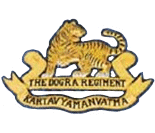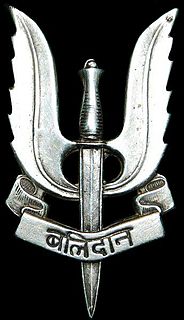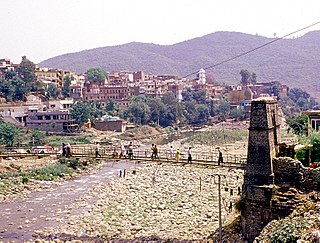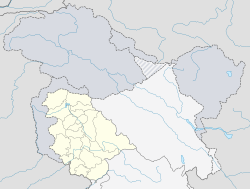
The Indo-Pakistani War of 1947–1948 or the First Kashmir War was an armed conflict that was fought between India and Pakistan over the princely state of Jammu and Kashmir from 1947 to 1948. It was the first of four Indo-Pakistani wars that was fought between the two newly-independent nations. Pakistan precipitated the war a few weeks after its independence by launching tribal lashkar (militias) from Waziristan, in an effort to capture Kashmir and to preempt the possibility of its ruler joining India. The inconclusive result of the war still affects the geopolitics of both countries.

The Dogra Regiment is an infantry regiment of the Indian Army. The regiment traces its roots directly from the 17th Dogra Regiment of the British Indian Army. When transferred to the Indian Army like its sister regiments, the numeral prefix was removed. Units of the Dogra Regiment have fought in all conflicts that independent India has been engaged in, making it one of the most prestigious and most decorated regiments of the Indian Army.

The Kumaon Regiment is one of the highest decorated regiments of the Indian Army. The regiment traces its origins to the 18th century and has fought in every major campaign of the British Indian Army and the Indian Army, including the two world wars.
The Rashtriya Rifles or RR is a branch of the Indian Army under the authority of the Indian Ministry of Defence. The RR is a counter-insurgency force made up of soldiers deputed from other parts of the Indian Army. The force is currently deployed in the union territory of Jammu and Kashmir, as well as the Ladakh union territory.

Para , also known as Para SF, are the special forces unit of the Indian Army. It is attached to the Parachute Regiment. The unit specializes in various roles including hostage rescue, counter-terrorism, unconventional warfare, special reconnaissance, foreign internal defence, counter-proliferation, counter-insurgency, seek and destroy and personnel recovery.

Rajouri is a district of Jammu region in the Indian union territory of Jammu and Kashmir. The Line of Control lies to its west, Poonch to its north, the Reasi district to the east and the Jammu district to its south. Rajouri is famous for its "Kalari". Representing an ancient principality, Rajouri was a joint district, along with Reasi, at the time of princely state's accession to India in 1947. The two tehsils were separated and Rajouri was merged with the Poonch district. Rajouri again became a separate district in 1968.

Rajouri or Rajauri is a town in Rajouri district in the union territory of Jammu and Kashmir, India. It is located about 155 kilometres (96 mi) from Srinagar and 150 km (93 mi) from Jammu city on the Poonch Highway. The town is the location of Baba Ghulam Shah Badshah University and the birthplace of Sikh General Banda Singh Bahadur.

The Azad Kashmir Regiment, also known as AK Regt, is one of the six Infantry Regiments of the Pakistan Army. As per the order of seniority, it is the Fourth regiment, but first to be raised after the Independence of country from the British Colonial rule of India. Its Regimental Centre is located at Mansar camp in Attock District on the border of Punjab and KPK province. The Regiment has participated in all major and minor operations and wars fought by the army and displayed high standards of valour. Notable commanders of the regiment include including Lieutenant-General Haroon Aslam, ex commander of Pakistan Special Services Group who led the SSG operation in Swat in 2009 and Lieutenant General Hidayat ur Rehman, who commanded successful operations in FATA from 2014 to 2016.
Military operations took place in Ladakh in 1948 during the conflict in Jammu and Kashmir between the Indian Army and Pakistani raiders infiltrated to capture the kingdom of Jammu and Kashmir. The eviction of this invading force of tribal raiders, who enjoyed numerical superiority, better lines of communication, commanding high ground and superior logistics, was a major military achievement for the small force of Indian soldiers.

Military operations took place in Poonch district, then part of the princely state of Jammu and Kashmir, in 1948 during the conflict in Jammu and Kashmir between the Indian Army and Pakistani and Azad Kashmir rebel forces. Poonch withstood a siege by these forces from November 1947 until relieved by an Indian offensive, Operation Easy on 20 November 1948. The besieged garrison, commanded by Brig. Pritam Singh, was maintained by air supply. Military operations ended with Poonch town and the eastern part of Poonch district in Indian hands and western part of the Poonch district in Pakistani hands.

Naib Subedar Chuni Lal AC, VrC, SM was an Indian Army soldier of 8th battalion. The Jammu and Kashmir Light Infantry. He was born in Bhaderwah, and basically from Gandhari Paddar and lived in Bhara village in Doda district of Jammu. Decorated with Vir Chakra and Sena Medal (Gallantry), JC-593527, Lal was martyred on 24 June 2007 in a militant flush-out operation in Kashmir’s Kupwara sector. These militants, all of whom were also shot dead, were trying to cross the Line of Control (LoC) and enter Indian territory. The success of this militant flush-out operation, which claimed his life, earned him the highest peacetime military decoration awarded for valor, courageous action or self-sacrifice away from the battlefield, the Ashok Chakra.

Mendhar is a tehsil in the Poonch district of the Indian union territory of Jammu and Kashmir. It is located in the foothills of Pir Panjal range within the Himalayas. The Mendhar Tehsil headquarters is in Mendhar town. It is located 60 km (37 mi) south of the Poonch district headquarters and 210 km (130 mi) from the state winter capital Jammu.
The Azad Kashmir Regular Force (AKRF) was the predecessor to the present-day Azad Kashmir Regiment of the Pakistan Army. In this form, it was part of Pakistan's paramilitary forces, operating out of the nominally self-governing territory of Azad Jammu and Kashmir. The AKRF was altered from a functioning paramilitary force and merged into the Pakistan Army as an infantry regiment following the Indo-Pakistani War of 1971.
Lieutenant General Kashmir Singh Katoch, MC was an Indian Army General and military adviser to the Maharaja Hari Singh of Jammu and Kashmir, officiating as the Chief of Staff of the State Forces during the Indo-Pakistani War of 1947. He later served as the Vice Chief of Army Staff of the Indian Army.

In Spring 1947, an uprising against the Maharaja Hari Singh of Jammu and Kashmir broke out in the Poonch jagir, an area bordering the Rawalpindi district of West Punjab and the Hazara district of the North-West Frontier Province in the future Pakistan. The leader of the rebellion, Sardar Muhammad Ibrahim Khan, escaped to Lahore by the end of August 1947 and persuaded the Pakistani authorities to back the rebellion. In addition to the backing, Prime Minister Liaquat Ali Khan authorised an invasion of the state, by the ex-Indian National Army personnel in the south and a force led by Major Khurshid Anwar in the north. These invasions eventually led to the First Kashmir War fought between India and Pakistan, and the formation of Azad Kashmir. The Poonch jagir has since been divided across Azad Kashmir, administered by Pakistan and the state of Jammu and Kashmir, administered by India.

Indian Army operations in Jammu and Kashmir include security operations such as Operation Rakshak which began in 1990, Operation Sarp Vinash in 2003 and Operation Randori Behak in 2020. Other operations include humanitarian missions such as Operation Megh Rahat and operations with a social aim such as Operation Goodwill and Operation Calm Down. The Indian Army works in tandem with the other arms of the Indian Armed Forces and security forces in Jammu and Kashmir such as during Mission Sahayata or joint operations.

Brigadier Rattan Nath Sharma, MVC, was an officer in the Indian Army who served with the Punjab Regiment, and was awarded the Maha Vir Chakra, India's second-highest award for gallantry in the face of the enemy. The award was made for his actions during the Indo-Pakistani War of 1971, when he displayed exemplary courage and outstanding leadership while commanding the 21st Battalion, Punjab Regiment, in a successful assault on a fortified Pakistani position near the Poonch River in the Jammu and Kashmir sector of the Western Front. He retired from the army in 1977 as a brigadier, after which he was the chief managing director of the Indian Farmers Fertiliser Cooperative. He died in a vehicle accident in December 2011.

The 1947–1948 Rajouri Massacres were the targeted killing of thousands of Hindu and Sikh residents and refugees in the Rajouri tehsil in the princely state of Jammu and Kashmir, by the Azad Kashmir Forces and Pashtun tribal militia during the First Kashmir War. The 'siege' of the town of Rajouri began on 7 November 1947 and ended on the 12 April 1948 when the Indian Army recaptured it. The massacre is commemorated annually in Rajouri and the Union Territory of Jammu and Kashmir.

The Battle of Haji Pir pass was a military engagement from 26 to 28 August 1965, during the Indo-Pakistani War of 1965 and resulted in India capturing the entire Haji Pir bulge including the 8,652 feet high Haji Pir pass in Pakistan Administered Kashmir.
Lieutenant General Bikram Singh, PVSM was a General Officer in the Indian Army. He was the General Officer Commanding XV Corps when he was killed in the 1963 Poonch Indian Air Force helicopter crash.
















